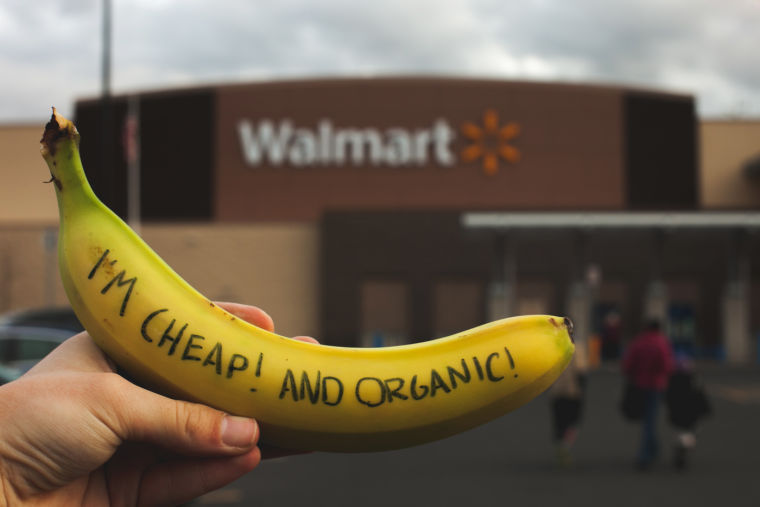Let them eat flax
April 17, 2014
Thanks a lot, Walmart.
The behemoth superstore recently announced it will begin selling 100 new organic products at 25 percent less than competitor’s prices, according to Forbes.
If organics truly hit the mainstream and all consumers get easy access to the hailed subset of grocery goods, how will I be able to flaunt my organic purchasing practices?
That’s exactly what Walmart plans to make happen. Jack Sinclair, the chain’s executive vice president of grocery, told Forbes that Walmart is removing the premium associated with organic groceries.
The premium Sinclair refers to is the on-average 30 percent higher cost of organic goods compared to their conventional counterparts, according to the USDA Economic Research Service.
I’ll be honest and say the chief reason I buy organic groceries is for just that: the premium. No premium means no novelty. What am I going to brag about now when I open my fridge to guests visiting back home?
I’ll show them my once-fancy naturally produced ingredients, and they’ll stare unimpressed. Then, I’ll cry a little inside while I munch on my low-sodium flax seed granola bar and tell myself I’d rather have that than a Snickers.
Yes, the potential price competition and broader spectrum of American families with access to quality groceries is just fine, but what about me?
The guy who buys expensive tiny bags of potato chips at Whole Foods Market just to feel like an upper echelon member of grocery shoppers? Did you think about me, Walmart?
Apparently they considered shoppers like me back in the early 2000s. They found people who shop at Walmart generally do not want to purchase higher-end products there, according to Good Morning America.
The report shows a 3.5 percent plunge in sales after the chain began experimenting with offering high-end products to their shoppers.
Are organics truly high-end products? Or have stores like Whole Foods simply conditioned us to believe they are by providing us with chic markets to match the posh department stores we shop at for similar reasons?
I just don’t want to buy my organic goods in the same place I can buy off-brand flat screens and spicy McChicken sandwiches or $5 Footlongs.
Target also decided to join the party and recently announced its “Made to Matter” line of organic and sustainable products, according to Forbes.
At least I can add a twang at the end of the word Target to make it sound French and in effect convince myself I’m more exclusive than the average Walmart shopper. Although Target and Walmart are generally the same concept, Target seems to push a cheap-chic vibe to its marketing practice.
Cheap chic isn’t good enough, though. I need high-end quality products at highway robbery prices from a trendy natural-foods store or organic co-op I can only find in an affluent foodie district or green-centric neighborhood.
I mean, Walmart carrying comparable organic products is going to remove the fun from strolling out of Whole Foods with full cart and empty wallet. If that’s the case, why would I tolerate inflated prices on items I could buy for cheaper?
More wholesome foods will be available to the average, equally-deserving American family, but snapping Instagram pictures of my food with #nofilter, as my organics aren’t artificially processed, won’t be nearly as envied by my peers.
– Fletcher Bailey is a junior communication major from Seattle. He can be contacted at 335-2290 or by [email protected]. The opinions expressed in this column are not necessarily those of the staff of The Daily Evergreen or those of Student Publications.



















